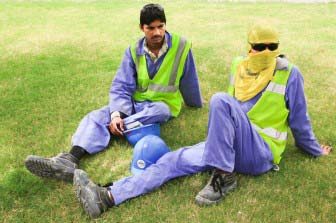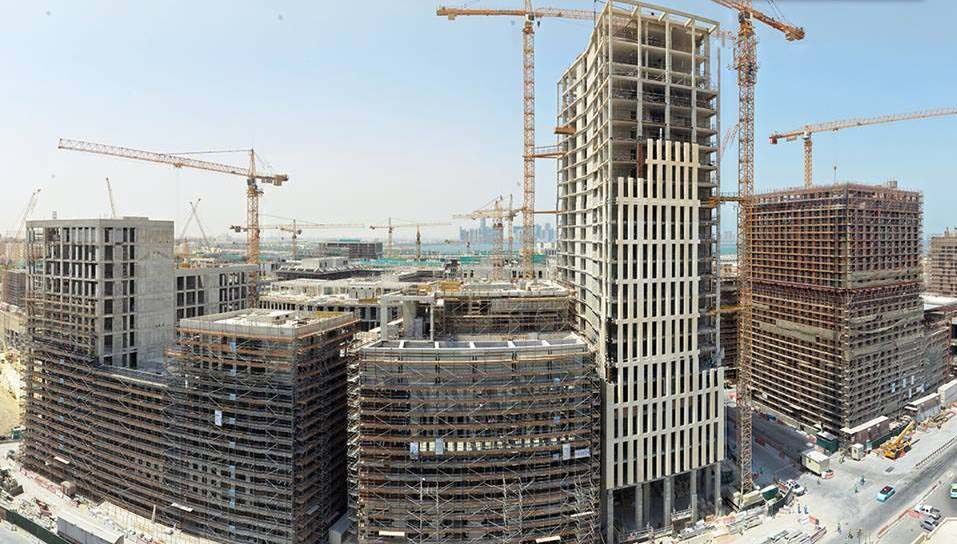
In a rare work stoppage, several hundred men at the Msheireb Downtown Doha construction site went on strike over the weekend and continue to remain off the job in a dispute over unpaid wages, a labor representative has said.
The employer, subcontractor Drake & Scull, told Doha News that the issue stemmed from a one-time delay in paying salaries because of new requirements under Qatar’s wage protection system.
Witnesses told Doha News that between 200 and 400 men stopped working at approximately 7am on Saturday. While most described the incident as a peaceful protest, others said some individuals aggressively confronted their supervisors.
Some men smashed air conditioning units and broke doors, said a Qatar-based representative of Building and Wood Worker’s International (BWI) – a trade union umbrella organization – who spoke to more than a half-dozen Drake & Scull employees who were involved in the protest.
The labor representative said the police were called in and helped mediate a temporary solution with managers by having the construction workers return to their accommodation in the Industrial Area.

He said the workers – who hail from India, Nepal, Bangladesh and the Philippines – were told they would be paid by Thursday and are receiving food at their labor camp since many have run out of money to purchase their own provisions.
During previous visits to Qatar, BWI officials visited Msheireb as well as other sites. At the time, delegates said during a press conference that they were generally pleased with what they saw at Msheireb but found a “disturbing evidence of wrong practices” and a general “climate of fear” among migrant workers in Qatar.
More recently, BWI published an article on its website this month about the formation of several “support networks” for migrant workers in Qatar.
Strikes
Strikes – especially those involving a larger number of workers – are uncommon in Qatar, where authorities are highly sensitive to dissent among its large foreign workforce.
They have previously responded to protests with a show of force, such as at a short-lived riot at the under-renovation Sheraton Hotel in June 2014.

A handful of other work stoppages occurred that year, including a protest by Al Million taxi drivers and a strike by employees of two subcontracting firms that led to the deportation of some 100 construction workers.
This risk of punishment means a strike “is often a last resort” for expats in Qatar, Amnesty International researcher Mustafa Qadri told Doha News.
Meanwhile, questions remain about whether the workers involved in this weekend’s strike will be disciplined.
“Their assumption is that (they will be paid) and be deported,” the BWI representative said.
In a statement to Doha News, Msheireb Properties confirmed that the incident caused work to be temporarily suspended on a small part of the 76.6-acre site on Saturday and Sunday.
The company added that while the strike did not involve any workers directly employed by the developer, the firm is working with its contractors to resolve the dispute.
Unpaid wages

Delayed or unpaid wages are one of the most common complaints of blue-collar expats in Qatar, whose treatment has come under scrutiny as the country constructs stadiums, infrastructure and real estate developments in the run-up to the 2022 World Cup.
However, Drake & Scull said this incident was an anomaly for the company caused by the new wage protection system, which took effect earlier this month and requires employers to pay their workers electronically. It also mandates firms create a digital record of the payments.
In a statement, the company – which has operations across the Middle East and further afield – told Doha News:
“The integration of workers’ records into the system faced certain technical issues and incompatibilities which resulted in a delay of the transfer of payments…
Drake & Scull management engaged with the workers to address their concerns immediately. The delay in payments was an unanticipated and unprecedented occurrence for Drake & Scull Qatar and we have taken the necessary steps to prevent such a situation from arising in the future.”
How long the workers went without a paycheck is still in dispute.
The BWI representative said the men he spoke to were being paid QR1,600 monthly, which includes a food allowance.
Msheireb Properties is a part of Qatar Foundation, which has published minimum worker welfare standards that require its contractors to go beyond what’s set out in the law. The company said it is investigating the incident and has already met with the main contractor and subcontractor to identify how the dispute arose:
“Msheireb Properties is working closely with parties involved to ensure that this situation is resolved as soon as possible and in a satisfactory manner,” it said, adding that it contractually requires all contractors and suppliers to abide by Qatar’s laws.
“Msheireb Properties is taking this incident seriously and is firmly committed to stand against any form of exploitation, abuse or injustice.”
Thoughts?







